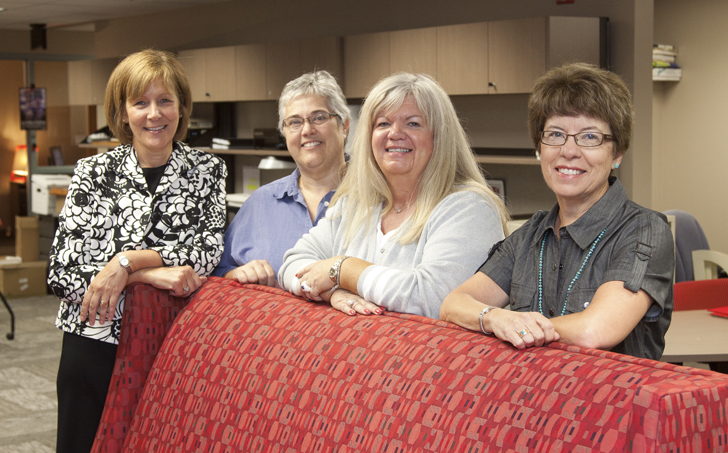
“I see the world as something larger than myself.”
A new civic engagement program at UNL is aimed at sparking that reaction in undergraduates. The program, unique in the Big Ten, wraps co-curricular experiences within UNL’s general education curriculum and participants — regardless of their home college or major — emerge with a Certificate in Civic Engagement.
Civic engagement, loosely defined as connecting classroom learning with the opportunity to make a difference in the quality of life in a community, has been high on the wish list for UNL for a number of years. And when UNL initiated a new general education curriculum, ACE, in 2009, it required students to complete coursework in 10 “pillar” areas. Two pillars focus on developing students’ individual and social responsibilities via courses focused on ethics and diversity.
UNL’s Achievement-Centered Education curriculum was designed to answer the question “What does it mean to be a UNL graduate?” The new civic engagement certificate helps answer that question and also ties neatly with the university’s land-grant missions of teaching, research and outreach.
“With ACE, we wonder, ‘do you really achieve an outcome just because you completed a course?’” said Nancy Mitchell, UNL’s director of undergraduate education, a division of Academic Affairs. “We looked to Student Affairs, where they have deep interest in this attempt to reinforce classroom learning with co-curricular experiences. The civic engagement program builds coherence for students and shows them how to use the tools of their education to be an active citizen who contributes to society.”
The new civic engagement certificate program will mentor students through the process of applying what they have learned to real-world experiences, helping them to analyze and reflect on their experiences and complete a service-learning project.
The first cohort of students begins the program with the spring 2012 semester. The goal is to roll the project out in a small pilot class, eventually attracting many more undergraduates.
“Service learning involves reflection and reciprocity,” said Linda Moody, director of service learning for the Center for Civic Engagement. “It matches an identified community need with a learning outcome for the student. The reflection ensures a deep experience where students think about and process what they are doing and how they are making a difference.”
Adds Kris Baack, director of leadership education for the Center for Civic Engagement: “You really have to do it together, the academic and co-curricular components. One without the other is out of balance. We are really excited about the integration of courses with students’ passion for volunteering and commitment. This creates synergy and wholeness.”
Moody said the desire for a civic engagement program has been a hot-button item for many. “Faculty were expressing the desire for an enriched academic and co-curricular experience and students said they were tired of sitting in a classroom just for knowledge sake. They wanted to put what they were learning to work to make a difference.”
Juan Franco, UNL’s vice chancellor for student affairs, was interested in boosting students’ opportunities for service and engagement when he arrived at UNL five years ago.
“UNL already had strong service-learning and leadership elements in place,” he said. “I wanted to expand that to engage students who have deep interest in doing good things for others.”
Under Franco’s leadership, UNL established ties with Campus Compact, a national umbrella organization that promotes student engagement and service learning and helps its member schools with programming and funding. UNL is among 12 Campus Compact schools in Nebraska, with others possibly joining in the future. The Nebraska Campus Compact office is housed in the Center for Civic Engagement.
Linda Major, assistant to the vice chancellor for student affairs, said that for more than a decade employers have reported wanting graduates to demonstrate high character, ethics and leadership. Students who earn the Certificate in Civic Engagement will have demonstrated those traits, a distinct hiring advantage.
The courses that support the certificate are embedded in the students’ course of study and are not additional requirements. To earn the certificate, students complete four three-credit hour courses, a student-designed upper-level capstone project and an e-portfolio documenting the learning experience. The certificate will appear on students’ official transcripts.
UNL is a national leader in working to engage students in pro-social behaviors, leadership development and co-curricular learning. Major has led several initiatives aimed to reduce high-risk behaviors, especially alcohol-related behaviors, at UNL.
Franco said these types of activities help UNL recruit new students and retain those already enrolled.
“Students who are engaged in something on campus are much more likely to retain and succeed,” he said. “These intense, intentional and focused programs are critical to those efforts, especially for at-risk students who need a little nudge or encouragement.”
“I feel like our students have so many poor examples of how to engage in the civic arena,” Major said. “Here, we have the rare opportunity to show them how to engage in a respectful informed and civil way, that we can have conflict with civility.”
Added Franco, “Today’s students are hungry for this type of learning opportunity. It’s a very giving generation who want to do things for others. We want to give them a little guidance in how to channel that desire.”
For more information, go to engage.unl.edu.
- Kim Hachiya, University Communications
More details at: http://go.unl.edu/vn7